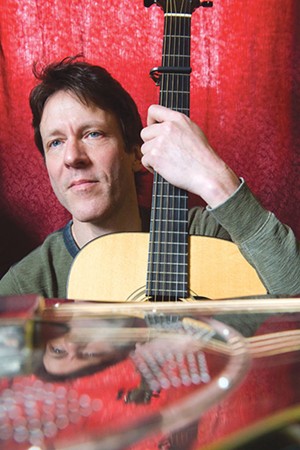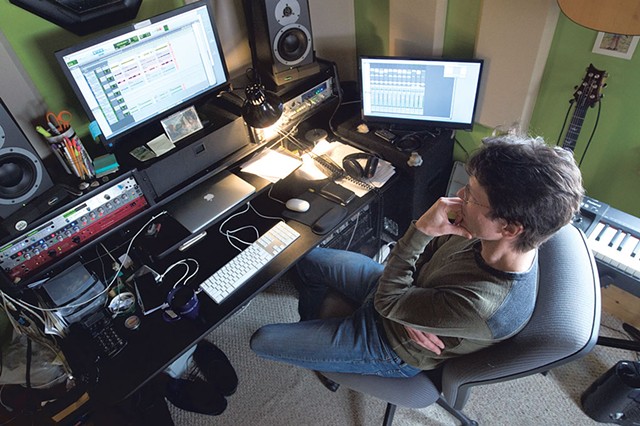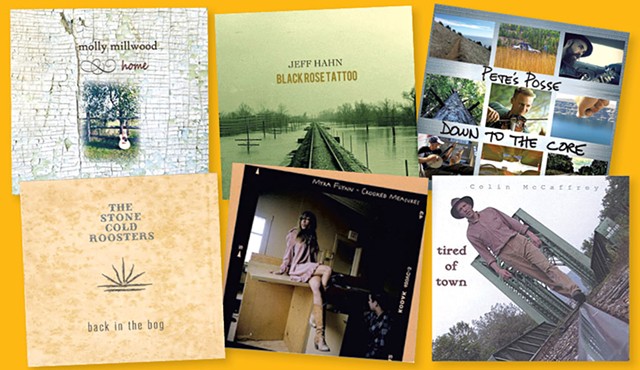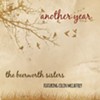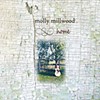Switch to the mobile version of this page.
Vermont's Independent Voice
- News
- Arts+Culture
- Home+Design
- Food
- Cannabis
- Music
- On Screen
- Events
- Jobs
- Obituaries
- Classifieds
- Personals
Browse News
Departments
Browse Arts + Culture
View All
local resources
Browse Food + Drink
View All
Browse Cannabis
View All
-
Culture

'Cannasations' Podcaster Kris Brown Aims to 'Humanize'…
-
True 802

A Burlington Cannabis Shop Plans to Host…
-
Business

Judge Tosses Burlington Cannabiz Owner's Lawsuit
-
Health + Fitness

Vermont's Cannabis Nurse Hotline Answers Health Questions…
-
Business

Waterbury Couple Buy Rare Vermont Cannabis License
Browse Music
View All
Browse On Screen
Browse Events
Browse Classifieds
Browse Personals
-

If you're looking for "I Spys," dating or LTRs, this is your scene.
View Profiles
Special Reports
Pubs+More
Musician and Producer Colin McCaffrey Seeks Imperfect Perfection
Published March 6, 2019 at 10:00 a.m. | Updated April 28, 2020 at 6:55 p.m.
click to enlarge 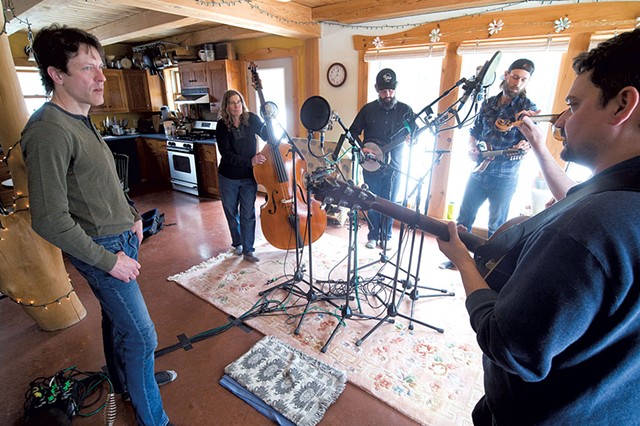

- Jeb Wallace-Brodeur
- Colin McCaffrey during a recording session with Beg, Steal or Borrow
By his own admission, Colin McCaffrey can be blunt to a fault. The Vermont musician and recording engineer concedes that his directness occasionally irritates people, including clients at his East Montpelier recording studio, the Greenroom.
"I've learned how to temper that to some degree," says McCaffrey, who has spent the last 20 or so years churning out local albums. Still, he won't hesitate to identify and correct a band's flaws when he hears them. Clam a string on a guitar solo or whiff a fiddle run, and he'll let you know. Write a nonsensical lyric, and he'll challenge it. Sing a sour harmony, and you can be sure he'll ask you to sing it again.
That's not to paint McCaffrey as some sort of tyrant in the studio. On the contrary, the man is affable and funny and has a subtle, wry wit. He's a young-looking 50, lean and slightly bookish, with sandy brown hair and sharp facial features, which he often complements with a wide-brimmed hat. In that way, he sort of resembles a younger, Vermonty James Spader.
Bands typically record in McCaffrey's sunny post-and-beam living room next to a woodstove. Large windows framing the room offer a picturesque view of a rolling yard and thick woods. The rustic, homey space is conducive to creativity, and McCaffrey fosters a warm and encouraging environment.
But he's unafraid to speak frankly, when necessary, in pursuit of a sort of imperfect perfection.
"He's really good about that," says Jeremy Sicely, the guitarist and vocalist of Beg, Steal or Borrow. The northern Vermont bluegrass band is currently recording its debut full-length with McCaffrey. "He picks up on subtle things and points you in the right direction."
"The last thing we need is a producer who won't give us criticism," adds the band's mandolinist, Geoff Goodhue.
"That's what people come to me for," McCaffrey says. "I'm not going to blow smoke up their ass and tell them their song is brilliant. If they're gonna ask me what I think of something, I'll tell them honestly. And I think people appreciate that."
McCaffrey's voluminous credits are a testament to all the musicians who appreciate his candor and approach. Over the past two decades, he has engineered, produced or played on more than 200 Vermont albums, some of which rank among the state's finest. That's in addition to countless smaller projects and one-offs.
McCaffrey is best known as a purveyor of twang and is often cited as Vermont's go-to engineer for folk, country, bluegrass and anything else adjacent to Americana. He's equally adept at capturing jazz and classical, and he's a fair hand at rock and soul, too.
"People might pigeonhole me as a folk artist, but I don't care," says McCaffrey. "I'll do whatever style of music that people throw at me. It's nice to have that freedom."
He's also a profoundly versatile musician and songwriter in his own right. While guitar and fiddle are his primary instruments, he's adept on practically anything with strings.
The defining trait of a McCaffrey record, whether his own or one he's engineered and produced for others, is clarity. His recordings are notable for crystalline fidelity and mixes that find equal space for every instrument and voice.
"He's meticulous," says Robert Resnik, a folk musician and the host of Vermont Public Radio's Sunday-evening music program "All the Traditions." "And he really has developed his own sound. His recordings are squeaky-clean."
"It's pristine," agrees Kristina Stykos of McCaffrey's work. A songwriter and musician, she's a fellow recording engineer who operates Pepperbox Studio in Chelsea.
Both Stykos and McCaffrey specialize in Americana and are arguably Vermont's two most sought-after producers in the genre. But their approaches are starkly different. In contrast to McCaffrey's spotless work, Stykos typically favors a grittier feel.
"He's honed Nashville production to perfection," she says, noting that she's previously sent him clients seeking a cleaner sound than what she offers. "He puts his own aesthetic stamp on his recordings, which often includes his own instrumental work, which is stellar."
"It's just the way I hear things," explains McCaffrey of his signature sound. "It's hard for me to intentionally obfuscate or color something, sonically."
Especially in acoustic music, purity is a prized asset. Unlike rock or other genres that might rely on layers of sonic trickery, acoustic music is most often recorded organically — or at least is meant to sound that way — with few or no effects to hide imperfections. That approach puts a premium on performance, which explains why McCaffrey is so particular with his clients.
Lately, though, he says he's begun to recognize that recordings too clean or slickly produced can lose a defining quality. "Sometimes you lose some elemental grit that the music might have," McCaffrey says. "So, it's finding a balance of cleaning up something that's distracting and is going to annoy the listener and knowing when to leave some imperfections in because they're real."
He adds: "The more I do this, the more I realize that perfection is actually kind of boring when you get there."
The Classicist
McCaffrey has a strong independent streak, which is probably why he runs one of the state's busiest recording studios in the middle of the woods. His home/studio sits just down the road from Goddard College, near the Plainfield/East Montpelier border. He and his wife — young-adult novelist and writing teacher Laura Williams McCaffrey — built the place 14 years ago. Previously, the couple and their two daughters, now grown, lived on the Cate Farm in East Montpelier. His former studio is now home to the charcuterie company Vermont Salumi.
Secluded and out of the way is how he likes it. McCaffrey is averse to attention and has little use for the posturing and brand building that shapes much of the music industry.
"So much of what's driven anything I've done over the past 30 years is just, if it feels like something vital and real, I'll do it," he explains. "Otherwise, I'm not interested. I just don't like the posing, the image. That's why I chose to live a little life in the hills."
McCaffrey was born in Brattleboro and grew up on an organic vegetable farm in Westminster. For a time, his parents operated a health food store out of their home. His father, a Queens native and devout Catholic, also ran what McCaffrey calls a "mystical Christian mail-order book company" from their house.
"He was an interesting dude," says McCaffrey of his father, who died in 1989. The elder McCaffrey was a big proponent of the arts and a friend of minimalist composer Philip Glass, and was involved with "the literary crowd" in New York City in the 1950s and '60s, McCaffrey says. But though his father didn't play music — "he could barely sing in tune" — he owned an enormous record collection of mostly classical and folk and a bit of blues.
"Occasionally a John Lee Hooker record made it in there, and I was like, Whoa. What is this shit? This is cool," recalls McCaffrey.
He fell in love with music early. By age 7, McCaffrey was obsessed with the violin and began learning on an instrument a neighbor gave him.
"The moment I heard fiddle tunes, I was like, Wow. That's awesome," he recalls.
But his love affair with violin soured at age 14, when McCaffrey began to train classically in private lessons.
"My teacher did not believe that fiddle music was a form of music," he explains. "He thought it was just shit. He was pushing me to go the first-chair violin track, but I was really turned off by the lack of appreciation of folk music."
Like millions of red-blooded American teenagers before him and since, McCaffrey turned to the electric guitar.
"Chicks dig that way more," he jokes.
McCaffrey played in garage bands throughout middle and high school, covering 1980s rock staples such as R.E.M. and U2, as well as classic rock. He also played guitar in the high school jazz band. Foreshadowing his musical versatility as an adult, McCaffrey picked up bass guitar, too; he realized he could make more money by not competing for work with scads of other guitarists.
"You can always find a gig as a bass player," he observes.
After high school, McCaffrey studied composition at the Berklee College of Music in Boston. It's a prestigious conservatory now, but he says it was less so in the late 1980s.
"Back then, if you had a pulse, you could get into Berklee," McCaffrey quips. "But it was the one school I applied to and the one school [where] I got in."
While there, he was faced with a realization: He didn't want to become a jazz guitarist.
"I love jazz, and I love swing," McCaffrey says. "But you've gotta be a genius these days to make a living playing jazz guitar."
So he focused on writing and composition, which served him well in later pursuits as a solo artist and as a songwriter with bands such as the Stone Cold Roosters, his current country outfit.
"I knew I could spend the rest of my life trying to learn guitar, but writing was something I wanted to dive into," McCaffrey says. "I'm really happy I did that."
Still, he found himself at odds with some aspects of Berklee's music-writing program.
"I was not interested in writing cool, obscure music," says McCaffrey. "We were being taught this atonal, postmodern, hip shit. It just didn't get me. It didn't have a soul. I tend to be more of a classicist or a romanticist in terms of style.
"It seems the older I get, the older the music [is] that I like," he adds. "A lot of different skill sets have pushed me in the direction of where I am now."
The Archetype
After college, McCaffrey returned to Vermont, landing first in Waterbury and then, in 1990, in Burlington, where he says he avoided playing music for a year.
"I just worked and drank beer and hung out and watched TV and enjoyed being a civilian for a while," McCaffrey says.
He eventually delved into the local jazz scene and played bass in various combos, including the Jazz Hooligans with Lee Gillis, Phil Carr and Carl Severance. McCaffrey also played guitar for the Swingin' Vermont Big Band and subbed regularly for the Vermont Jazz Ensemble.
Around the same time, he began making inroads into Vermont's thriving traditional folk scene. In particular, McCaffrey took notice of Pete Sutherland and his band the Clayfoot Strutters.
"I loved what I was hearing them do," he explains, "which was mashing up contemporary styles with traditional stuff."
McCaffrey also found work as a studio session player and began to learn the recording process by osmosis.
"I started watching over people's shoulders to see how a good engineer works and how a not-so-good engineer works," he recalls.
Slowly but surely, McCaffrey laid the foundation for his own engineering career and built a vast network of musicians and other engineers to call upon when he needs session players or help with production. It might be easier to list the individuals McCaffrey hasn't worked with in Vermont than those with whom he has. His reputation among those collaborators is nearly as pristine as his music.
"He's got great ears," says Lane Gibson, a Charlotte-based recording engineer who has worked with McCaffrey on more than 80 projects. "And he's great on so many different instruments. We work very well together."
"He's the archetype of Vermont studio owners in that we're all players, too," says André Maquera, owner of West Street Digital recording studio in St. Albans. He cites McCaffrey's versatility as a key to his success.
"He can think like any instrumentalist," continues Maquera. "He can think like a bass player. He can think like a dobro player, a banjo player, a fiddler. So he can really optimize and bring the best qualities of those instruments out, even if he's not playing them. His strength is the size of his musical vernacular."
Burlington jazz pianist Tom Cleary agrees. He and his wife, vocalist Amber deLaurentis, recently recorded a pair of albums with their band at McCaffrey's studio. One is a relatively straightforward jazz record. The other is composed of original material that leans into pop terrain. "It's like having nonidentical twins," comments Cleary.
An affiliate artist in the University of Vermont Department of Music and Dance, Cleary says McCaffrey's "multilingual" facility in a variety of styles was key in their sessions. "Colin is so fluent in the jazz and folk traditions, and the pop traditions," he says. "He's the kind of musician that, as teachers, we're trying to create: someone who is fluent in notation, has highly developed ears and is fluent in technology. He understands the studio as an instrument."
"He's like the Michael Jordan of the recording studio," adds deLaurentis, an affiliate artist with the same UVM department. "His ears are razor-sharp, and he's so skilled with editing. And he really understands an artist's vision for the songs."
The Crucible
Beg, Steal or Borrow's Sicely and Goodhue are sitting in McCaffrey's Greenroom on a recent afternoon. The studio's command console, adjacent to the living room, is the size of a walk-in closet and is painted green — hence its name.
"The room is not very big," concedes McCaffrey. "But I've made a ton of records in here that sound like they came from somewhere bigger."
The musicians are listening to a track they've been recording called "Harder Than Time." It's a pretty, lilting bluegrass ballad with close harmonies and hardscrabble lyrics inspired by the history of Barre's granite quarries. But one line rubs McCaffrey the wrong way. When it comes around, he stops the tape.
"What do you sing there?" the engineer asks Sicely, who responds by singing the line: "There's a little piece of every man works down in the quarry mine."
Then McCaffrey does what few recording engineers or producers would have the temerity, or even care enough, to do: He questions the logic of Sicely's writing.
"I'm not sure that makes sense," McCaffrey says. The two discuss the line for a few minutes before arriving at a solution that nails the workingman aesthetic Sicely was aiming for: "There's a little piece of every man left down in the quarry mine."
It's one of several small but crucial tweaks that McCaffrey suggests over the course of seven or eight takes of the tune. Each one buffs away a blemish like fine-grit sandpaper: Don't sing "and" at the start of each line, just sing the line. End vocal harmonies together. Emphasize the word "rock" on the downbeat to clean up phrasing. Make the fiddle drop out after a solo to create dynamic variance.
"I pride myself on helping people get through what I call 'the crucible of the recording process,'" says McCaffrey. "Because it really is an amazingly intense, focused amount of practice. You're doing something over and over until you get it right.
"And I've seen some amazing improvements in people's musical abilities through that process, which I've really enjoyed," he adds.
Listeners have enjoyed them, too.
"He clearly has a way of getting good material out of beginners," says Resnik.
Fellow engineer Gibson opines, "He's great at bringing out the best in someone by making small improvements on lyrics, arrangements or musical ideas."
McCaffrey says that's because he's been through the crucible himself so many times with his own music. And he will again this spring, when he heads to Nashville to record a new solo album.
"I know from writing hundreds of my own songs that every single word and every single syllable and how it's delivered and where it's placed, on or off the beat, those things can either augment the melody or destroy it," says McCaffrey. "And it's usually in those little moments of tracking where you start to see how one little word — an 'and' or a 'but' — can destroy the flow of a lyric.
"I care about the song, and I want to understand what the person is trying to say," McCaffrey concludes.
Being able to deliver that kind of criticism, especially to artists who might be precious about their writing, is a delicate endeavor. McCaffrey says he honed his skill in constructive criticism through teaching private lessons.
"You learn how to be a psychologist to get the best out of people," he says, noting that he also takes pride in "being able to keep an ear out for whatever is going on in the room and what people are feeling, and trying to put out emotional fires or any kind of trouble that might be occurring."
Sometimes, McCaffrey acknowledges, that means "staying out of the way and letting people do their thing, but being ready to offer a suggestion that might really smooth things out."
After all, smooth is McCaffrey's stock-in-trade, critics be damned.
"Some people might consider what I do to be too slick," he muses. "But I will say that I've been making a living at this for 20 years and put two kids through college. So if I'm a hack, so be it."
Colin McCaffrey, a Selected Discography
In his two decades as a recording engineer and producer, Colin McCaffrey has engineered, produced or played on more than 200 Vermont albums. Below is a brief pick of some notable works.
Molly Millwood, Home (2016)
This warm, intimate folk record from Millwood, a clinical psychologist and associate professor at Saint Michael's College, was practically a duet album with McCaffrey. The songwriter credited the producer as "the antidote to my doubt and inhibition."
Jeff Hahn, Black Rose Tattoo (2016)
The dusky-voiced Burlington detective and songwriter's debut album was a decade in the making, but it was worth the wait. Several cuts were featured on the Netflix series "The Ranch." Hahn recently released a McCaffrey-produced follow-up, Start a Fire Tonight, featuring musical partner Lila Mae.
Pete's Posse, Down to the Core (2015)
Local folk music stalwart Pete Sutherland has long been an influence on McCaffrey, who helmed the sophomore recording of Sutherland's genre-mashing, multigenerational trio.
The Stone Cold Roosters, Back in the Bog (2013)
The third record from the McCaffrey-led honky-tonk outfit is also the group's finest. It's a Vermont classic that nods to Bakersfield country-and-western swing, propelled by McCaffrey's acute, winking humor as a songwriter.
Myra Flynn, Crooked Measures (2009)
The record is notable as the LA- and Vermont-based Flynn's debut but also as a testament to McCaffrey's stylistic range. A mashup of soul, folk, R&B, rock and piano balladry, the album hints at the singer's successes to come.
Colin McCaffrey, Tired of Town (2006)
McCaffrey's third solo record is a favorite of Vermont Public Radio's Robert Resnik. In a 2006 Seven Days review, the local folk music authority praised the album's spare arrangements and its revelation of the musician's multitude of talents.
The original print version of this article was headlined "Finely Tuned"
Related Stories
Got something to say?
Send a letter to the editor
and we'll publish your feedback in print!
Tags: Music Feature, Colin McCaffrey, the Greenroom, record producer, recording studio, music production, Video
More By This Author
About The Author

Dan Bolles
Bio:
Dan Bolles is Seven Days' assistant arts editor and also edits What's Good, the annual city guide to Burlington. He has received numerous state, regional and national awards for his coverage of the arts, music, sports and culture. He loves dogs, dark beer and the Boston Red Sox.
Dan Bolles is Seven Days' assistant arts editor and also edits What's Good, the annual city guide to Burlington. He has received numerous state, regional and national awards for his coverage of the arts, music, sports and culture. He loves dogs, dark beer and the Boston Red Sox.
Speaking of...
-

Jason Raymond Teaches Aspiring Producers at the Make Music Club
Jun 8, 2022 -

Producer Extraordinaire Willverine Is On a Mission to Collaborate
Sep 15, 2021 -

Joshua Sherman Spearheads an Arts-Led Revitalization in Norman Rockwell’s Arlington
Jul 14, 2021 -

Robot Dog Studio's Ryan Cohen Gets the Job Done Right
Apr 4, 2018 -

Album Review: Tiffany Couture, 'She Still Rises'
Oct 11, 2017 - More »
Comments
Comments are closed.
From 2014-2020, Seven Days allowed readers to comment on all stories posted on our website. While we've appreciated the suggestions and insights, right now Seven Days is prioritizing our core mission — producing high-quality, responsible local journalism — over moderating online debates between readers.
To criticize, correct or praise our reporting, please send us a letter to the editor or send us a tip. We’ll check it out and report the results.
Online comments may return when we have better tech tools for managing them. Thanks for reading.
- 1. On the Beat: New Music From Phish and a Family Folk Affair in Grafton Music News + Views
- 2. Soundbites: Burlington Record Plant On the Move Music News + Views
- 3. Three Quick-Hit Reviews of Local Albums Album Review
- 4. Soundbites: Umphrey's McGee Loves Burlington Music News + Views
- 5. Frankie White, 'brain dead' Album Review
- 6. Community Garden, 'Me vs Me' Album Review
- 7. On the Beat: Vermont Native Adam Tendler Returns, New Music From Jesse Taylor Band and Justin Levinson Music News + Views
- 1. Soundbites: Trouble & Together at the Flynn Music News + Views
- 2. Soundbites: Burlington Record Plant On the Move Music News + Views





























